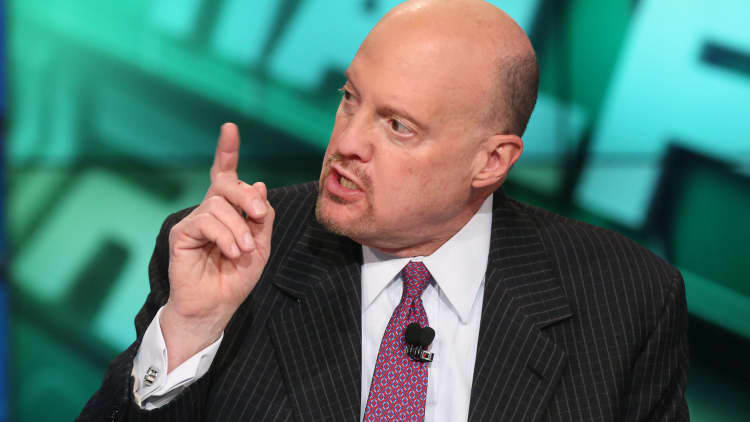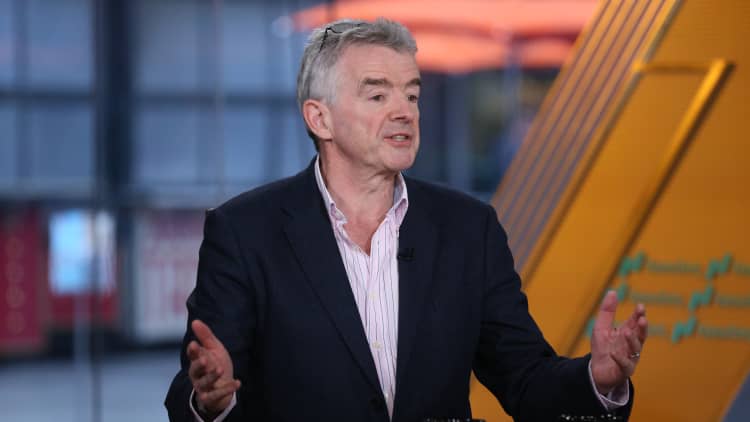
Boeing CEO Dennis Muilenburg is apologizing to relatives of the 346 people killed in two fatal crashes of its 737 Max planes and said the company has work to do to restore the flying public's trust.
"I do personally apologize to the families," Muilenburg said in an interview with the "CBS Evening News" that aired Wednesday. "We feel terrible about these accidents. We apologize for what happened. We are sorry for the loss of lives in both accidents."
Aviation authorities across the world grounded Boeing's 737 Max planes in mid-March following a crash of one of the aircraft in Ethiopia. That crash happened less than five months after another Max went down in Indonesia. The worldwide grounding has hit the company's stock, which is down more than 17% since the March disaster and left some airlines scrambling to find enough planes to meet peak summer demand.
Investigators in both crashes have implicated an automated flight control system that many pilots said they didn't know about until after the first crash. That system appeared to have been triggered by erroneous sensor data that pushed the nose of the planes down repeatedly into deadly plunges.
Boeing is facing multiple lawsuits from victims' families. The Chicago-based aircraft manufacturer and the Federal Aviation Administration are under fire over the regulator's approval process for the jets, which included outsourcing some functions to Boeing employees, which is allowed under FAA regulations.
Boeing and the FAA are also facing scrutiny from lawmakers over the anti-stall system and warnings for pilots. Boeing earlier this month said it knew for more than a year that a cockpit alert that indicates if the data so-called angle of attack data that sensors are picking up are in conflict wasn't working properly, before it told the FAA, after the Lion Air crash in Indonesia in October.
"The implementation of that software, we did not do it correctly," Muilenburg told CBS. "We are fixing it now, and our communication on that was not what it should have been."
Muilenburg, who has been at Boeing for more than three decades, told CBS the crashes have "had the biggest impact on me than anything that's happened" and that they affect "me as a leader of this company."
Earlier Wednesday, Muilenburg told an investor conference in New York that the flying public's trust was damaged by the two crashes.
"We know ... that the public's confidence has been hurt by these accidents and that we have work to do to earn and re-earn the trust of the flying public, and we will do that," Muilenburg said. "We are taking all actions necessary to make sure that accidents like those two ... never happen again."
Public confidence is a challenge not just for Boeing but for its airline customers. In the U.S., American, United and Southwest have more than 70 of the planes in their fleets, combined, and have canceled thousands of flights during the peak summer travel season as the Max remains grounded. United and Southwest executives last week said once they can operate the planes again, the airlines will not charge passengers who book a flight on the Max date-change fees or fare differences if they prefer to fly on another model of aircraft.
Boeing has completed a software change to make the questioned automated system, known as MCAS, less powerful and give pilots greater control. The FAA and other countries' aviation authorities plan to review the changes, along with updated pilot training material, before the jets can fly again.
Boeing and the FAA are under fire over the regulator's approval process for the jets, which included outsourcing some functions to Boeing employees, which is allowed under FAA regulations.
The FAA last week hosted aviation officials from more than 30 countries to review where things stand on again allowing the planes to fly. The acting chief of the FAA, Daniel Elwell, said it had no solid timeline to allow the jets to return to the skies.
Boeing has a backlog of about 4,400 orders for its popular 737 Max planes. After the grounding, it paused deliveries and cut production from 52 a month to 42.
The company, which has been storing undelivered aircraft at its facilities in Washington state and in San Antonio, will likely ramp up production. Muilenburg said long-term demand means a 737 Max production rate of 57 a month "could make sense."
He said some customers may delay their 737 Max deliveries while others may want to take delivery sooner.



